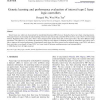64 search results - page 4 / 13 » On the Benefits of Representing Music Objects as Fuzzy Sets |
SSDBM
2005
IEEE
14 years 29 days ago
2005
IEEE
Modern geographic information systems do not only have to handle static information but also dynamically moving objects. Clustering algorithms for these moving objects provide new...
MM
2010
ACM
13 years 7 months ago
2010
ACM
The size of personal music collections has constantly increased over the past years. As a result, the traditional metadata based lists to browse these collections have reached the...
EAAI
2006
13 years 7 months ago
2006
Type-2 fuzzy sets, which are characterized by membership functions (MFs) that are themselves fuzzy, have been attracting interest. This paper focuses on advancing the understandin...
RSCTC
2000
Springer
13 years 11 months ago
2000
Springer
We discuss how Case Based Reasoning (CBR) (see e.g. [1], [4]) philosophy of adaptation of some known situations to new similar ones can be realized in rough set framework [5] for c...
SSDBM
2005
IEEE
14 years 29 days ago
2005
IEEE
Modern database applications including computer-aided design, multimedia information systems, medical imaging, molecular biology, or geographical information systems impose new re...

